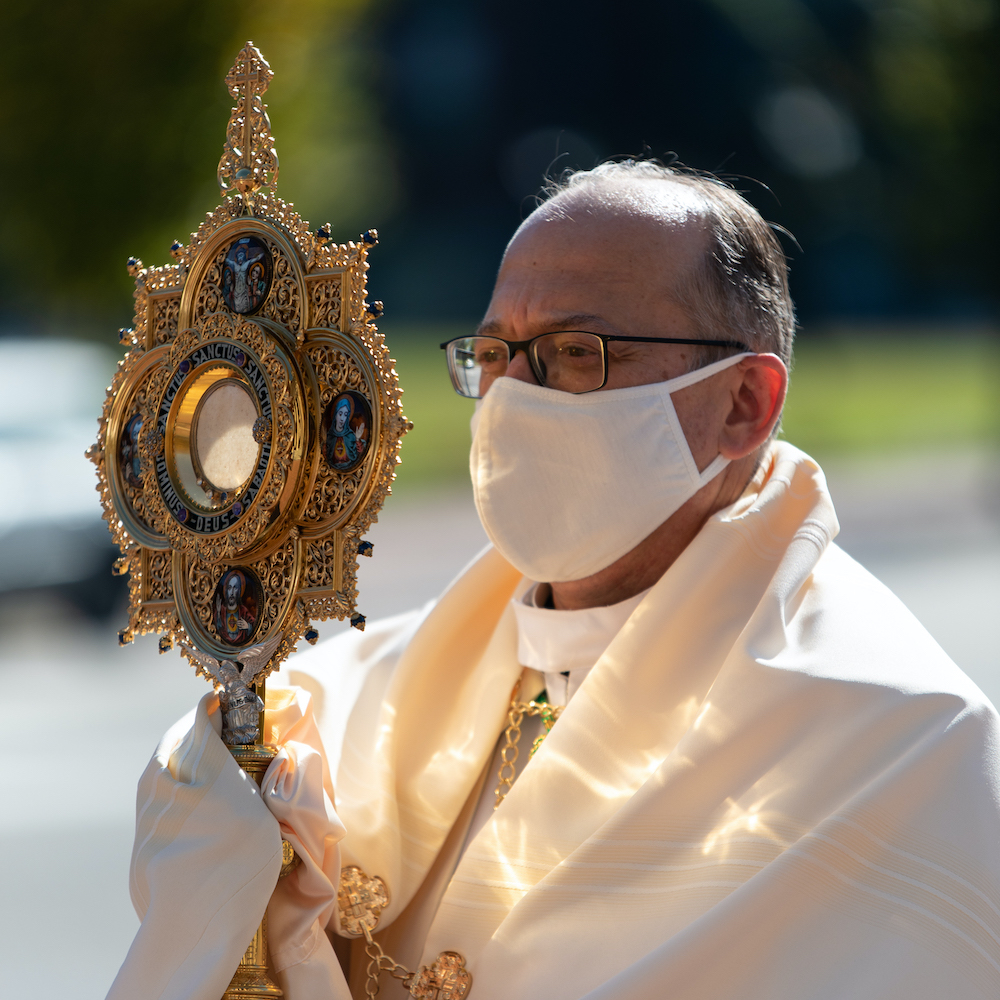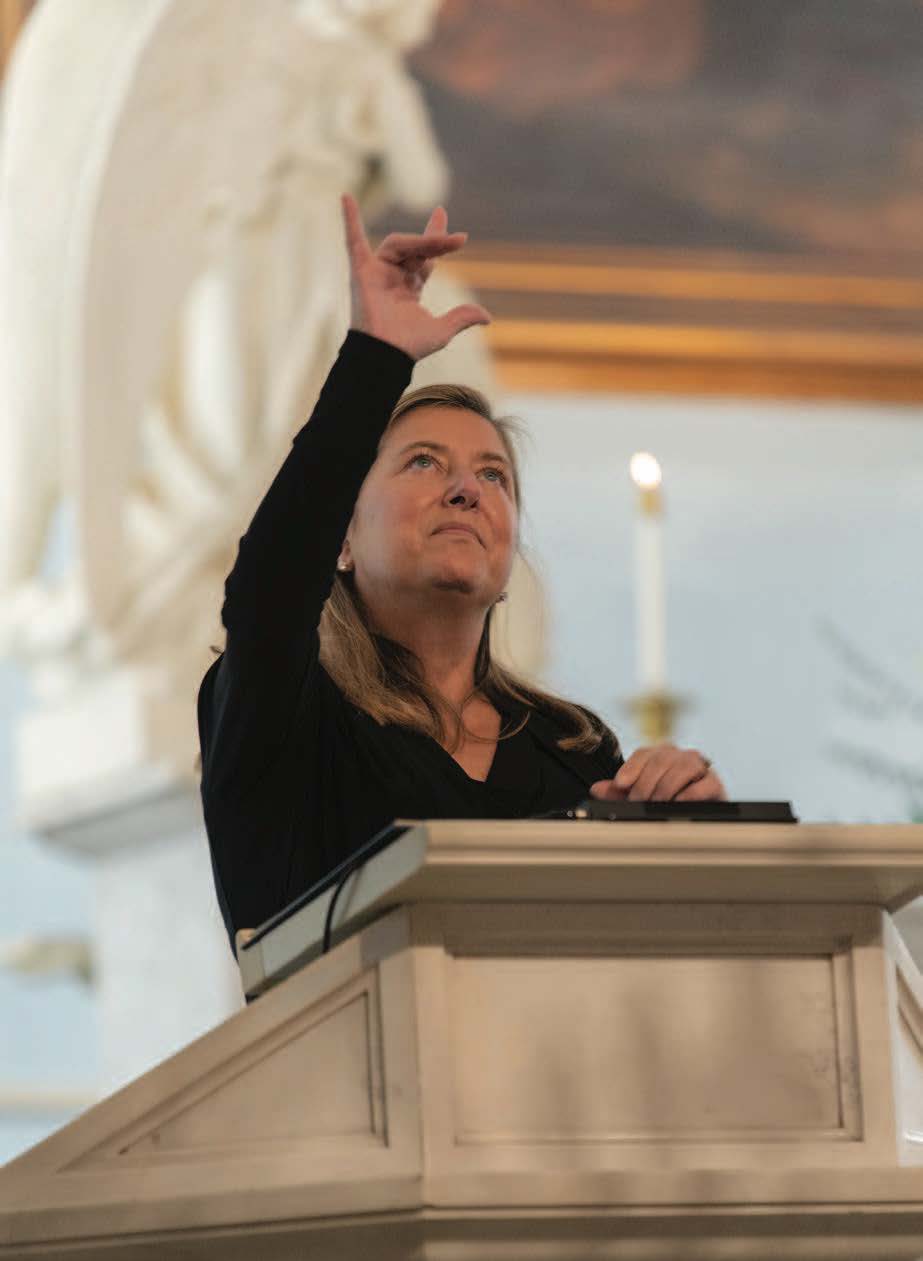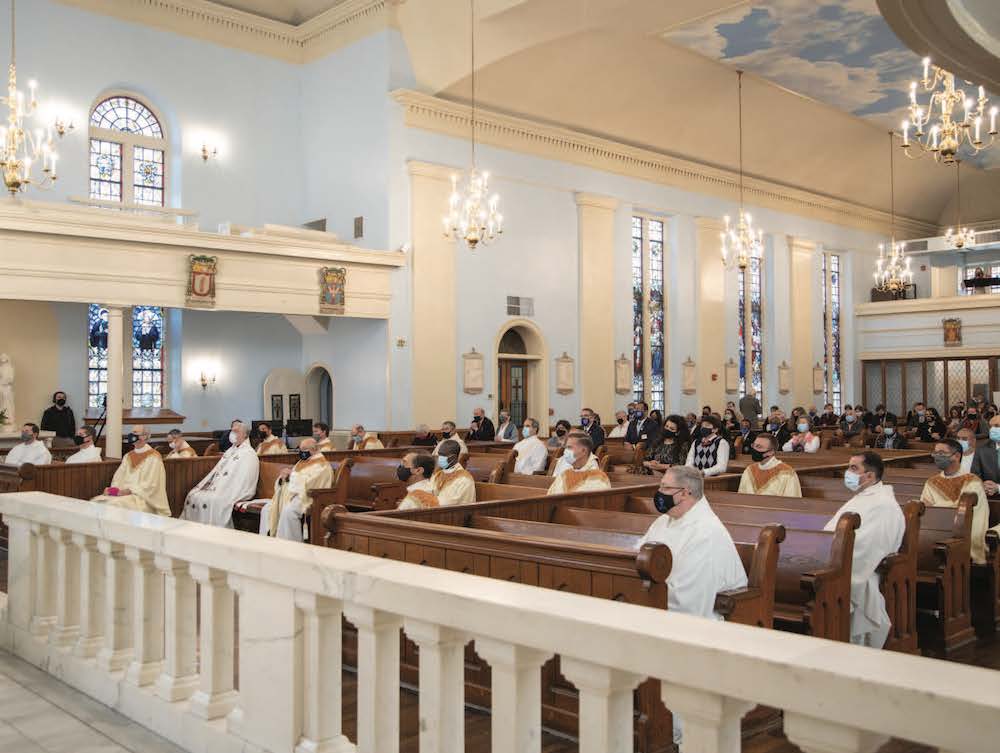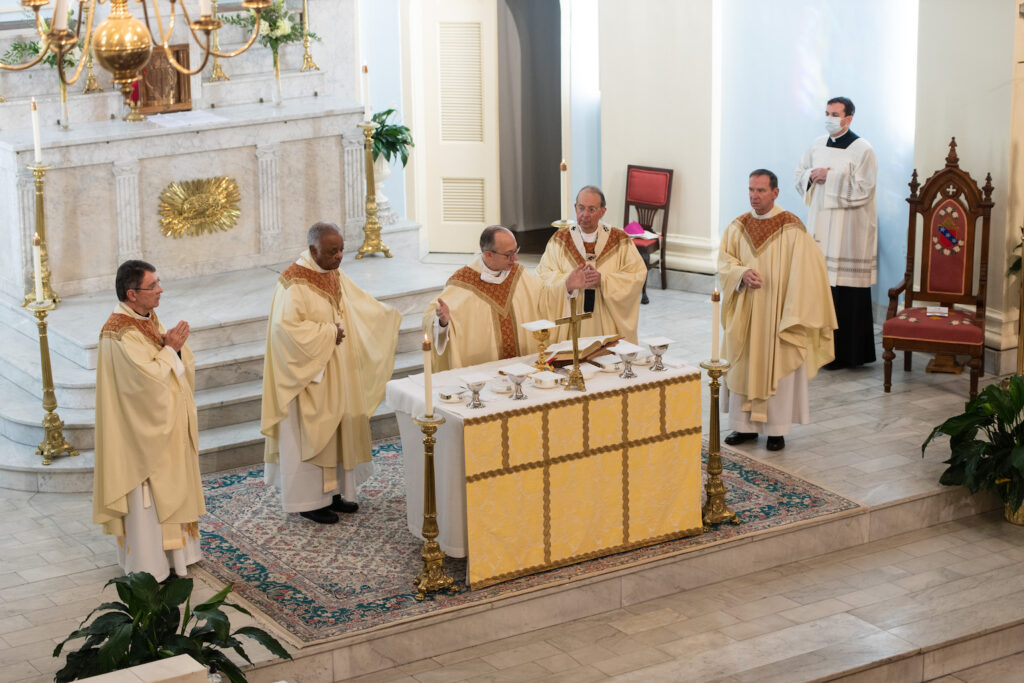As the culminating event for the commemoration of its bicentennial year, the Diocese of Richmond had big plans for its first Eucharistic Congress. It envisioned thousands of parishioners gathering in a convention center to celebrate its history by listening to keynote and breakout session speakers, praying, participating in eucharistic adoration and celebrating Mass.
But as COVID-19 spread, those plans were greatly curtailed. The congress, held Friday night and Saturday, Nov. 6 and 7, was primarily a virtual event, one that reflected the times but also the diversity of the diocese.
Speakers’ presentations in English, Spanish and Vietnamese were taped for participants to access. Parishes were encouraged to gather in prayer. Multiple tracks were designed for young adults, youth and children and adults with special needs.

However, Mass and a Holy Hour on Nov. 7 were live, with 80 people in attendance at each liturgy. Six bishops and three archbishops, including Archbishop Pierre Christophe, apostolic nuncio to the United States, Archbishop William E. Lori of Baltimore, and Cardinal-designate Wilton D. Gregory of Washington, who gave the virtual keynote address on Nov. 6, concelebrated the livestreamed Mass with Bishop Barry C. Knestout at the recently designated St. Peter Pro-Cathedral in Richmond. St. Peter was the diocese’s first cathedral, consecrated in 1834.
At the beginning of Mass, Archbishop Lori spoke of the connections between Baltimore and Richmond, noting that prior to becoming a diocese in 1820, Richmond was under the jurisdiction of the Archdiocese of Baltimore. Several of the new diocese’s bishops had been priests of that archdiocese. Its ninth archbishop, James Gibbons, was the fourth bishop of Richmond.
Greetings from the Holy See
Archbishop Pierre read the greetings of Cardinal Pietro Parolin, Vatican Secretary of State, to the people of the diocese:
“His Holiness Pope Francis was pleased to learn that the celebrations marking the two hundredth anniversary of the establishment of the Diocese of Richmond will conclude with a Eucharistic Congress to be held on 7 November 2020.
“His Holiness prays that this bicentennial will inspire in the faithful a fresh awareness of their baptismal dignity and their call to proclaim the joy of Gospel, bearing witness to the truth, mercy and love of Jesus Christ through their service to God and neighbor. In this way, they will contribute to the growth of the Church in holiness and to the spiritual renewal of society “not only with words, but above all by lives transfigured by God’s presence” (Evangelii Gaudium, 259).
“Commending you and all the priests, religious and lay faithful to the loving intercession of Mary, Mother of the Church, His Holiness willingly imparts his Apostolic Blessing as a pledge of peace and joy in the Lord.”
Responding to the Great Commission
During his homily, the bishop spoke about communion and mission, the bicentennial’s themes. Drawing upon the Great Commission in Mark 16:15-20, the bishop noted that the Richmond Diocese had carried out that commission for 200 years.
“The people of the Church of Richmond have transformed the unforgiving, hostile wilderness and vast territory of the diocese into a refuge of the presence of God,” he said. “It has taught the faith and celebrated the sacraments in many languages, responding to the needs of native-born and immigrants alike.”
He noted they have carried out the mission in faith, hope and love.

“The Church of Richmond has brought the unity of the faith to the chaotic broken world, so that the power of God would conquer everything that harms the dignity of the human person,” Bishop Knestout said. “It has ministered to the weak, vulnerable and sick, bringing the healing power of the sacraments and the comfort of our faith in times of conflict, pestilence and pandemic.”
New status for downtown church
Near the end of Mass, the bishop read from the decree he signed on Oct. 28, designating that St. Peter Church would be known as the Pro-Cathedral of St. Peter.
The decree notes the significance of the church, stating that it “has expressed the aspiration of the Catholic faithful in this city and diocese to be accepted as full participants in the society of the Commonwealth of Virginia.” It also highlights that the church “educated and cared for generations of children through various schools and orphanages” and that “it has continued to nourish the Catholic faithful and served the poor of the city.”
Bishop Knestout stated, “We hereby decree, during this bicentennial jubilee of the Diocese of Richmond, that the parish of St. Peter in Richmond, Virginia, the Reverend Gino Paul Rossi, being pastor, will henceforth be known as the Pro-Cathedral of St. Peter.”
The designation “pro-cathedral” indicates that the church served as a cathedral at some point in the local Church’s history. St. Peter served that function until the Cathedral of the Sacred Heart was dedicated in 1906.
‘Take Jesus to the streets’
Bishop Michael F. Burbidge of the Diocese of Arlington delivered the Holy Hour homily at the Cathedral of the Sacred Heart. Arlington was part of the Diocese of Richmond until it became a diocese in 1974.
The bishop alluded to the pandemic.
“Perhaps these months have reminded us of how easy it is to take the precious gift of the holy Eucharist for granted and to lose what St. John Paul II referred to as ‘eucharistic wonder and awe,’” he said. “We will always have that wonder and awe when we receive the gift with devotion.”
Bishop Burbidge also noted the turmoil and injustices that the nation is experiencing.
“Now, more than ever, it is Jesus we must bring into our streets and communities in the sure and certain hope that he will heal, renew and unite us,” he said. “That is what we will actually do today: carry Jesus in a eucharistic procession on our streets and into a world desperately in need of his presence and saving work.”
From adoration to action
In his keynote address, “A Eucharistic Vision for Today’s World,” Cardinal-designate Gregory required action.

“True eucharistic devotion is not a substitute for social justice, Christian involvement with the world, or Gospel-based charity,” he said. “In a similar vein, those who promote and encourage a deeper eucharistic devotional life must be aware that the favored result of a eucharistic spirituality is a greater commitment to the charity and justice called for in the Gospel by Christ himself.”
Those who participate in eucharistic devotion, the cardinal-designate said, have an “obligation to take upon yourself the very mission of Christ.”
“One cannot pray before the Blessed Sacrament — the Bread of Life — and not eventually also recall that all those who dine on the Lord’s generosity have a responsibility in justice and in charity to respond to the needs of those who hunger for ordinary bread each day,” he said.
Cardinal-designate Gregory explained what should result from eucharistic devotion.
“The true evidence of a proper eucharistic devotional life is a deeper commitment to the needs of the poor, the forgotten, the ones whom Christ identified as the least of his sisters and brothers,” he said. “True eucharistic devotion must connect us with the still unfinished work of eradicating racism in our society — a topic that has come to the fore in recent months perhaps as never before.”

